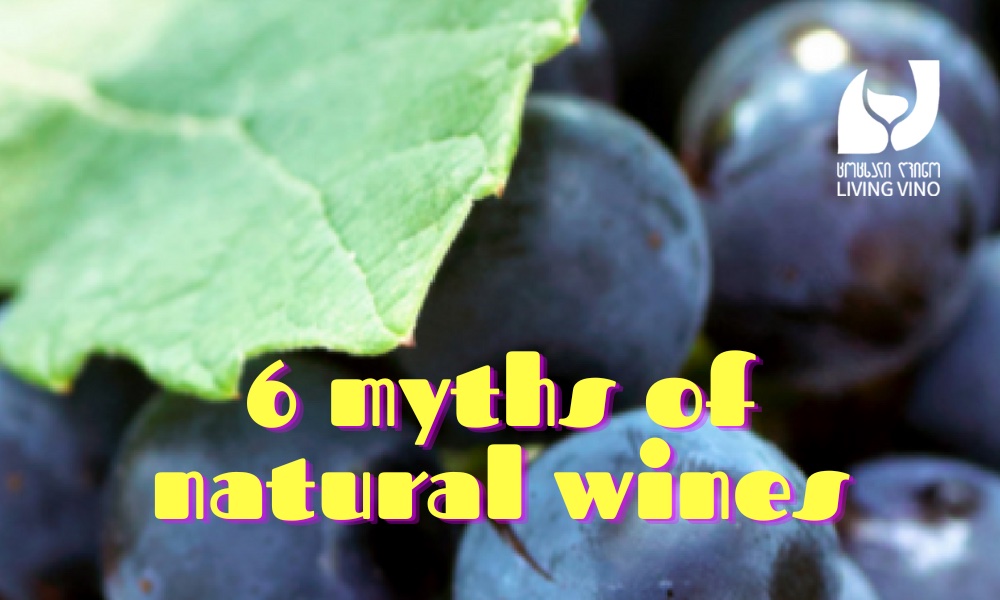
Running a natural wine bar, we at Living Vino get so many eye-opening reviews from our guests who have tried natural wine for the first time. Many first-timers could not believe how tasty are these natural wines and how light and energetic they felt the morning after!
But of course we get a lot of questions whether wines with no added sulphites really exist and whether they are too weird or can spoil quickly. This blog post is designed to answer the most popular questions that also could be called as myths about natural wines. Let’s go!
These natural wines smell and/or taste weird and/or bad
Natural wines are generally full of character – the winemaker doesn’t stop or encourage processes, so your wine is usually fermented to dryness and is very expressive of the terroir and the grape variety. The absence of sulphites also means that they are still living in the bottle, so a bit more sediment, than you probably accustomed to, is common. Same goes for the light sulphuric smell that is just a natural by-product of fermentation – you shouldn’t worry, it will dissipate really quickly.
Natural wines, do you mean they are just made by your grandma?
There is no real certification with regards to a term ‘natural’. Most of the natural wines are those made with no little intervention from the winemaker’s side. As it is a process that happens in a winery, there are also some certifications used to regulate what happens in the vineyard, namely organic and biodynamic. Many natural winemakers also practice organic viticulture. Organic standard also means that there is a restriction on sulphites at 100mg/l. So, to answer this question, natural wines are generally a high-quality artisanal product made with a stricter adherence to hygiene, quality of grapes and the whole winemaking process. Best examples compete with conventional wines and some are winning real awards. To us, natural wines are real wines.
You’ve mentioned sulphites. So what’s the problem with them? Why do we need to watch out?
Strictly speaking, sulphites are preservatives. A very tiny dose (usually up to 10mg/l) occurs naturally as a result of fermentation, and as we’ve mentioned already, these are harmless. The problem becomes a bit more serious when winemakers decide to add sulphites almost on every stage of the process. Sulphites accumulate in your body, and even WHO recommends a safety guideline for sulphites. For the time of writing this post, this is about 0.8mg per kg or your weight. So, say, an average man of 80 kg should consume not more than 64mg a day. Taking into account that most conventional wines contain 200mg sulphites or more, it means that after just 1 glass of wine you’re done for the day. Oh come on!
Natural wines die quickly, they are not destined for ageing.
Well, as you already know, the absence of sulphites, the preservatives, means that the wines are living in the bottle. If you will care for that bottle well (correct temperature, absence of sunlight, etc), these natural wines can live long and healthy life of a wine. There are obviously other considerations, such as grape variety and level of winemaker precision when they were crafting these wines, but there shouldn’t be any difference with conventional.
Our wine expert, who holds WSET Diploma, can attest to that – he has tried natural, wines of 20 – 25 years old and they were amazing!
Are these natural wines really healthier and better for you?
Yes and there is no doubt about that.
To start with, natural wines are made in sync with nature, so you aren’t ingesting unnecessary pesticides or other nasties with it.
Studies also confirmed that natural wines tend to have higher antioxidant levels than conventional wines.
Similarly, these studies also shown that organic wines are being ingested and tolerated by your liver better. That means lighter effect on your body, less headaches if you are prone to it and better mornings.
Organic wine benefits as per studies by the Department of Nutrition of the University of Southhampton; University of Rome’s Clinical Nutrition; University of California at Davis and University of Newcastle.
I’ve heard that sulphites can cause rash, headaches and more severe symptoms.
Yes, this time it is not a myth, but actually something that may happen. First of all, m there are people suffering from asthma. For them, sulphites over 50mg/l can cause rashes, headaches and even suffocation. That is the reason we decided in Living Vino to limit the levels to below 45 mg/l – so our natural wines are safe for everyone!
In addition to that, there are 3 to 5% of population that is generally prone to allergies. These people can also feel the effect of sulphites. So if you ever thought that one glass of red wine should not have given you that mind-boggling headache in the morning, there is a big chance it was the allergic reaction to sulphites.
Natural Wines: The Verdict
We believe that natural wines are not only for people with wine intolerances. Natural wines are tastier, more expressive and represent the land and the winemaker’s passion. Natural wines are better for you and once you go natural, you’d be hooked.
Natural wines that we select here at Living Vino can be named as no added sulphites or sometimes sulphite-free wines (sulfite-free wines), and we would like more people to switch from conventional to natural. Welcome to Living Vino!
-
 Mixed Case of Natural WinesProduct on sale
Mixed Case of Natural WinesProduct on sale225.00 ₾199.00 ₾

Join Living Vino Club!
Sign up today for free to:
- Be the first one to know about our new vegan dishes, events and offers;
- Receive invites for our Members-only dinners with winemakers;
- Take part in our giveaways;
- Receive your 10% discount code now!
Simply sign up with your email & you’re in!



